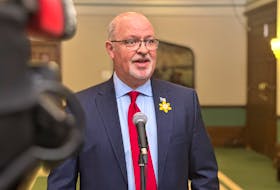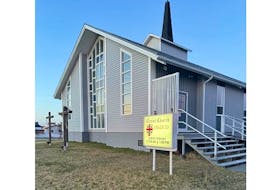ST. JOHN'S, N.L. — The Newfoundland and Labrador Medical Association (NLMA) is raising alarms over a shortfall in medical student placements in this province.
“This is certainly a disappointing year,” NLMA president Dr. Charlene Fitzgerald said. “It is a signal of worsening problems for the province when we are already woefully short of family doctors.”
The Canadian Resident Matching Service “matches” medical students to training positions across Canada. Of the 35 family medicine residency positions in Newfoundland and Labrador, 13 went unmatched, all of them outside the eastern region, the NLMA said.
It’s the highest number of first-round vacancies since 2014.
“Too many people in this province do not have access to a family doctor, with untold consequences to their overall health,” said Fitzgerald. “The NLMA has made proposals to the provincial government on how to address the problems with family medicine. Patients cannot wait any longer. The government must begin to act now.”
Fitzgerald said while there will be another round of matches, the low interest in family practices in the first round is not a good sign.
“In terms of recruitment and retention of doctors … those first-match candidates are the prime suspects for the family doctors for the future of the province,” she told The Telegram Thursday.
“We’re concerned that this represents concern on the part of medical students that Newfoundland and Labrador doesn’t represent a good place to practice in the future," she said.
“We’re advocating for some changes in the practice environment, as well as some improvements in retention and recruitment bonuses for residents and medical students.”
Right now, she said, there are no such bonuses for those finishing university here, while other provinces offer them.
Recruitment and retention will play an important role in contract negotiations with the province, she added.
The current contract ends next year. Talks have not yet started.
Outside the House of Assembly Thursday, Health Minister John Haggie said family medicine uptake across the country was down in the first match-up.
“Yes, it’s a concern, but we’re only halfway through the process,” he told reporters.
Haggie said the province’s financial package to prospective doctors is attractive, but retention is a problem.
To that end, he said the most effective approach is for people in the community to help to show potential candidates what their region has to offer.
Haggie said the main problem in this province is not quantity, but quality. Setting up medical teams that work well together does more to improve health care than simply hiring more doctors, he said.
“The challenge is really around access, not numbers.”
Earlier story:
The Newfoundland and Labrador Medical Association (NLMA) is raising alarms over a shortfall in medical student placements in this province.
“This is certainly a disappointing year,” NLMA President Dr. Charlene Fitzgerald said in a release. “It is a signal of worsening problems for the province when we are already woefully short of family doctors.”
The Canadian Resident Matching Service “matches” medical students to training positions across Canada. Of the 35 family medicine residency positions in Newfoundland and Labrador, the NLMA said 13 went unmatched, all of them outside the Eastern region.
It’s the highest number of first round vacancies since 2014.
“Too many people in this province do not have access to a family doctor, with untold consequences to their overall health,” said Fitzgerald. “The NLMA has made proposals to the provincial government on how to address the problems with family medicine. Patients cannot wait any longer. The government must begin to act now.”









